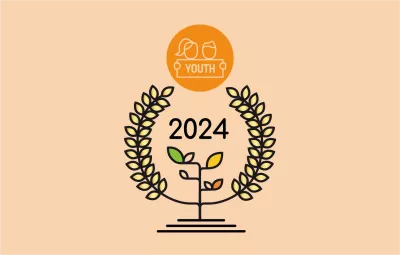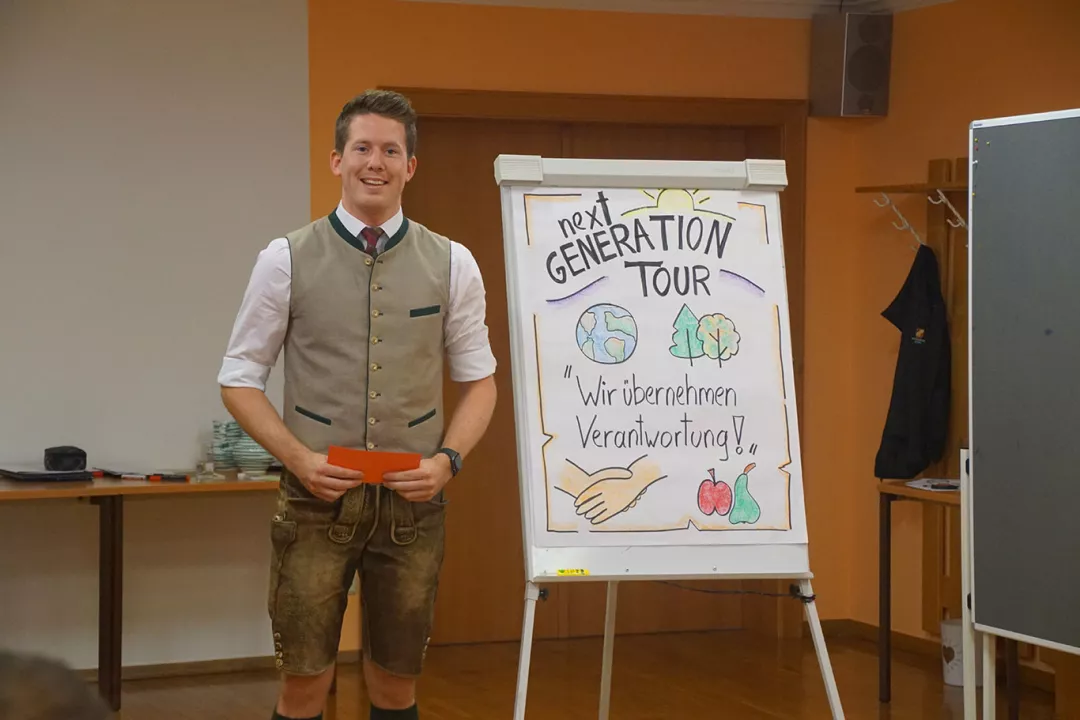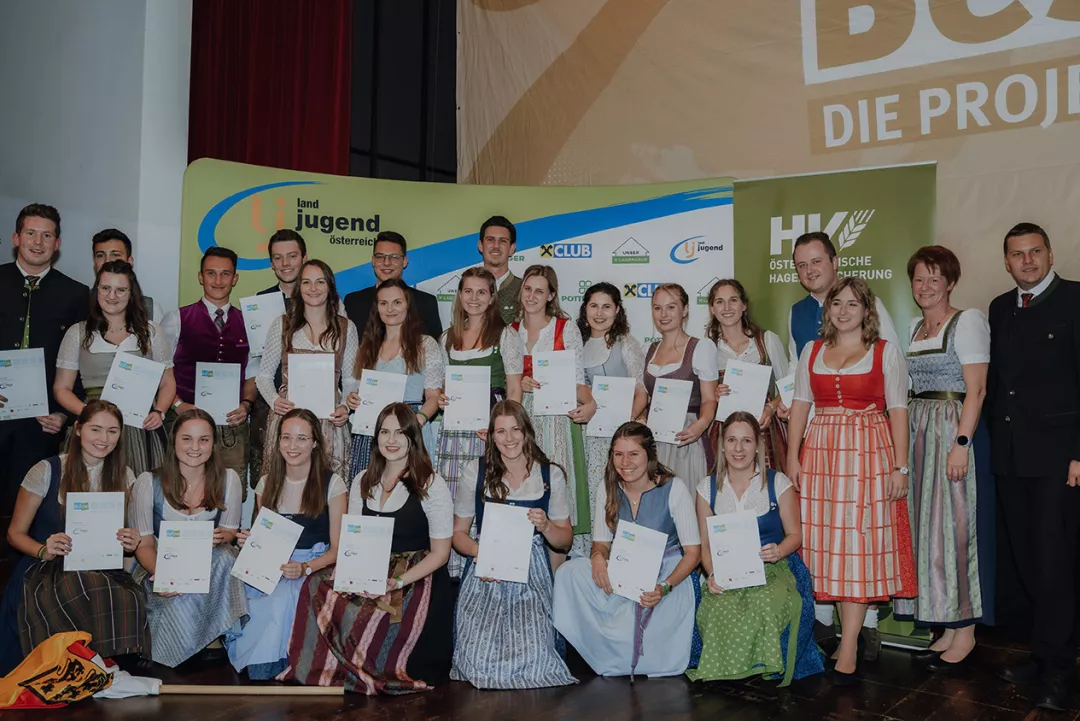General information
RDP Priority
- P1. Knowledge transfer and innovation
RDP Focus Area
- 1C: Lifelong learning & vocational training
RDP Measure
- M01: Knowledge transfer & information actions
Beneficiary type
- Non-governmental organisation
Summary
The young entrepreneurs training course is an annual high-quality professional development course for 30 people to promote personal strengths and leadership qualities. The training course is categorised at level 4 in the Austrian National Qualification Framework, which is structured in line with the eight-level European Qualifications Framework.
The training course is organised by Rural Youth Austria, a non-formal education provider, and is structured in four modules: self-confidence and moderation, project management, conflict management and motivation, and project implementation.
Taking part in the project helps young people generate value for their rural regions or farms. International trainers are available to provide theoretical input and help transfer the knowledge from theory to practice.
The projects carried out as part of the training programme have won national awards and enhanced the reputation of agriculture and rural regions.
Results
- Thirty young people take part every year, with Rural Youth Austria ensuring gender balance.
- Training course has a long-lasting effect on young people in rural areas – 300 projects implemented or co-initiated by graduates in communities or on farms each year.
- Young people become resilient through training and can react to changes in the market, the environment or production conditions in an action-oriented manner.
- Young people in rural areas are prepared to take responsibility for improving living conditions, benefiting the state and communities by creating responsible citizens.
- Young non-farmers taking part in the course are in demand – they learn to work and manage teams independently, get to know potential local companies and often find employment.
- Young farmers raise their economic awareness and react more resiliently to market requirements with innovative projects – all in all, they become more competitive.

Promoter
Landjugend Österreich
Funding
Total budget: EUR 26 799
EAFRD: EUR 10 597
National: EUR 6 505
Regional: EUR 4 337
Private/Own funds: EUR 5 360
Context

Rural Youth Austria is an important innovation driver for rural areas in Austria. With around 100 000 members in 1 200 local groups, it is the largest youth organisation in Austria and offers six main areas of non-formal education: general education, agriculture and environment, culture and traditions, sport and society, service and organisation, and young and international. The organisation welcomes young farmers and young people living in rural areas.
About 6% of young people in Austria are part of this organisation, making it an important advocacy body for the interests of young people. The organisation’s (six-person) decision-making board is all young volunteers, always led by one male and one female member. This equal dual leadership starts at national level and extends to the local clubs.
The organisation sees itself as a bridge-builder between agriculture and consumers, young and old, and urban and rural areas. In addition to their main task of producing food, Austrian farmers also make an important contribution to maintaining social life in rural areas, including culture and traditions. Rural Youth Austria's training courses provide young people with the expertise they need to professionalise their work.
The work of Rural Youth Austria aims to create awareness and understanding of good coexistence in rural areas — 39% of Austrians live in rural areas and 27% in suburban regions. Many consumers have lost their awareness of the food system and how food is produced, and this often leads to conflicts. Proactive project work prevents this and gives young people meaningful leisure activities.
Objectives
Participants in the course research and evaluate topics relevant to rural youth and/or agriculture business. Graduates should be able to speak professionally, master presentation and argumentation techniques, and be proficient in media design (to visually enhance topics) and moderation techniques (for leading discussions and planning sessions).
Graduates also need to master basic project management, enabling them to independently plan and organise rural youth work and/or farm projects, coordinate rural youth activities and manage administrative tasks responsibly. They should also involve rural youth club members in decision-making with methodically prepared opportunities and use motivation-enhancing exercises to activate and engage youth in community activities.
They also have to implement public relations measures to promote projects and represent rural youth interests, and assume leadership in group dynamics, using exercises and methods to lead and intervene as needed, including conflict management.
Financial planning and task handling are also critical.
Activities
The course was advertised through a flyer and the social media account of Rural Youth Austria. Participants were then selected according to internally defined criteria. Attention was paid to a balanced proportion of farmers and young people from rural areas without an agricultural background.

Four modules were then taught.
Module 1 (32 teaching units): training course A was held from 17-19 February 2023 in Carinthia and course B from 10-12 February 2023 in Salzburg. The content focused on confidence, appearance, profile and professionalism, as well visual design (using flipcharts, cards etc.), argumentation with persuasive power, and moderation skills.
Module 2 (32 teaching units): training course A was held from 24-26 March 2023 in Lower Austria and course B from 17-19 March 2023 in Tyrol. The content focused on finding creative and innovative ideas for projects and project realisation.
Module 3 (72 teaching units): this is a self-study module in which a project is carried out with a self-assembled project team. Participants are supervised by the secretariat of Rural Youth Austria during implementation, and as part of mandatory meetings, they must submit an update on the project and reflect on their activities to that point.
Module 4 (48 teaching units): training course A was held from 28 September-1 October 2023 in Styria and course B from 5-8 October 2023 in Upper Austria. The content focused on motivating and mobilising teams with leaders and confidence in conflict situations, followed by the final presentation of the implemented project.
The participants could then enter their projects into the national project competition organised by Rural Youth Austria. The jury consists of office staff from the national organisations, as well as stakeholders from politics, banks, agriculture and industry. The aim is to demonstrate to the stakeholders the innovative power of young people in rural areas. The award for the best project was presented on 18 November in Tyrol. All submitted projects were invited to this event with the project team and received a certificate of successful participation in the training course. In addition, all awarded projects receive a gold, silver or bronze medal.
After the course, Rural Youth Austria internal media (print magazine: 63 000 editions, 250 000 readers; Facebook: 11 500 followers, Instagram: 10 400 followers) as well as press releases were sent to media representatives.
Main results
Thirty young people take part in the training course every year, with Rural Youth Austria ensuring gender balance when selecting candidates. The course goes on to have a long-lasting effect on young people in rural areas, with 300 projects each year implemented or co-initiated by graduates in communities or on farms.
The course encourages young people to become resilient and react to changes in the market, the environment or production conditions in an action-oriented manner. It helps young people in rural areas be prepared to take responsibility for improving living conditions, which in turn benefits the state and communities by creating responsible citizens. Young farmers also raise their economic awareness and react more resiliently to market requirements with innovative projects – all in all, they become more competitive.
Young non-farmers taking part in the course find themselves in demand. They learn to work and manage teams independently and get to know local companies in so doing. It is not uncommon for this to lead to employment opportunities.
Key lessons
First and foremost, the course provides positivity. Young people who implement a project are so enthusiastic about their new perception of themselves, and with the feedback from their social environment, the majority of them work on further projects the following year, with over 300 implemented in Austria every year.
Young people are becoming a driving force in rural areas. By equipping them, the course helps them make Austria's rural areas and businesses fit for the future and gives those areas and businesses a positive image.
The course has also built up a very good reputation and, as such, little marketing is required, with applications exceeding course places.
Tobias Lang

